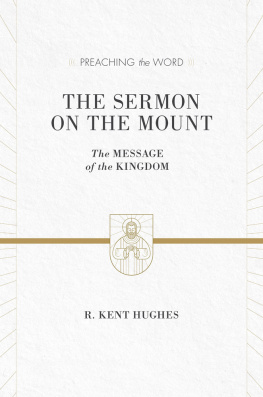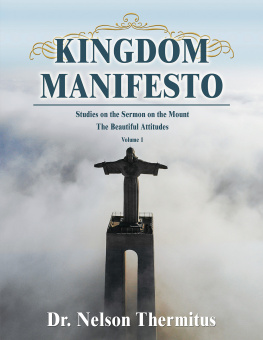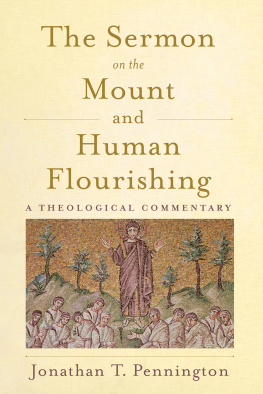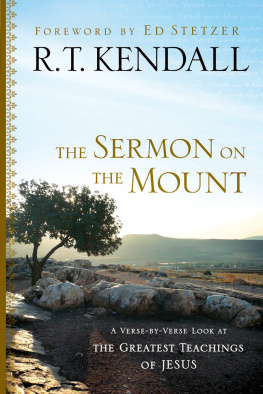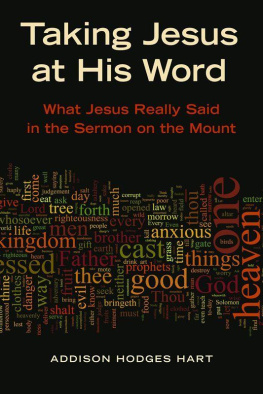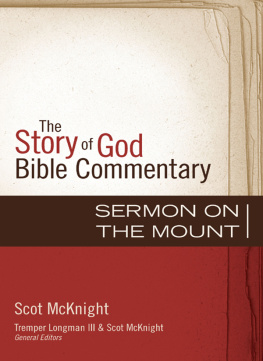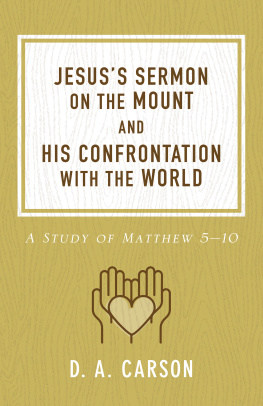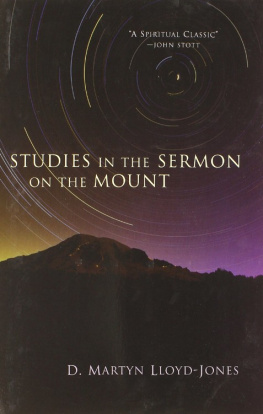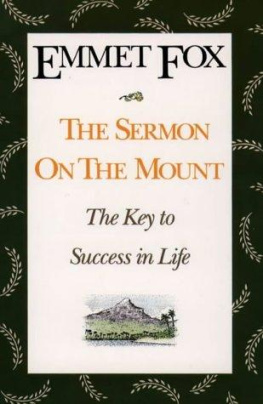The Sermon on the Mount
The Perfect Measure of the Christian Life
Frank J. Matera

LITURGICAL PRESS
Collegeville, Minnesota
www.litpress.org
Cover design by Stefan Killen Design. Cover photo iStockphoto.
Scripture texts in this work are taken from the New Revised Standard Version Bible: Catholic Edition 1989, 1993, Division of Christian Education of the National Council of the Churches of Christ in the United States of America. Used by permission. All rights reserved.
2013 by Order of Saint Benedict, Collegeville, Minnesota. All rights reserved. No part of this book may be reproduced in any form, by print, microfilm, microfiche, mechanical recording, photocopying, translation, or by any other means, known or yet unknown, for any purpose except brief quotations in reviews, without the previous written permission of Liturgical Press, Saint Johns Abbey, PO Box 7500, Collegeville, Minnesota 56321-7500. Printed in the United States of America.
The Library of Congress has cataloged the printed edition as follows:
Library of Congress Cataloging-in-Publication Data
Matera, Frank J.
The Sermon on the Mount : the perfect measure of the Christian life / Frank J. Matera.
p. cm
Includes bibliographical references.
ISBN 978-0-8146-3523-0 ISBN 978-0-8146-3548-3 (ebook)
1. Sermon on the mountCriticism, interpretation, etc. I. Title.
BT380.3.M38 2013
226.906dc23 2012044194
Dedicated to the Parishioners of
Holy Family Parish, Davidson, Maryland,
followers of Christ in the way of discipleship,
whom I have been privileged to serve from 1990 to 2012.
Preface
The Sermon on the Mount is a classic text, by which I mean that it can be read repeatedly without exhausting its meaning. Exactly why this is so, I am not sure; but I suspect that it has something to do with the one who first spoke its words. In this sermon Jesus teaches with an authority that derives from his unique relationship to God; he speaks with the authority of the Son of God. Perhaps this is why, even though the sermon has been commented on by numerous authors, we always find something new in it.
It was Professor Jean Giblet who first introduced me to the Sermon on the Mount in his lectures on the Synoptic Gospels at the University of Louvain nearly fifty years ago. Since then I have taught the Sermon on the Mount as part of my own course on the Synoptic Gospels for nearly thirty years, and more recently I have taught a graduate seminar on the sermon with my colleague, Professor William Mattison, a theologian of moral theology, who has been exploring the ethical dimension of the sermon for several years. That seminar taught me that the sermon can be read in different ways. This volume is my attempt to read it in a manner that makes it accessible to a larger audience of those who want to know what it means for their daily life.
The theme of this book is as follows: the Sermon on the Mount calls us to single-minded devotion to God. It invites us to be perfect as God is perfect by being wholehearted and undivided in our allegiance to God. It is a call to perfection for all Christians to be lived out in the whole of life. It is not a new set of rules and regulations; it is a call to discipleship in light of the in-breaking kingdom of God. It is, as the subtitle of this book indicates and Augustine said long ago, the perfect measure of the Christian life.
While this book is informed by critical scholarship, I have not written it for the members of the scholarly guild, although I hope that some of them will read it. I have written it for all who seek to live the Christian life. Accordingly, I have tried to write with a sense of passion and urgency about this topic since my concern is for living rather than analyzing the Christian life. While the sermon has a long and complicated critical history that I will briefly describe in the introduction to this work, my primary concern has been to focus on what it means today. This is not to say I have forgotten or neglected what the sermon meant. But that is not my primary concern. What I wish to accomplish is quite simple: provide readers with a reading of the sermon that will enrich and nourish their lives as disciples.
I am indebted to many people who have generously taken the time to read and comment on this manuscript. Among them I single out my colleagues at the Catholic University of America: Christopher Begg, William Mattison, and Regis Armstrong, and my friend and colleague Ronald Witherup, the Superior General of the Society of Saint Sulpice. All have made important contributions to this text. Most importantly, they have encouraged meand for this I am grateful.
Frank J. Matera
June 1, 2012
The Feast of Justin Martyr
The Catholic University of America
Washington, DC
Introduction
The Sermon on the Mount and the Christian Life
Some years ago, I read The Cost of Discipleship by Dietrich Bonhoeffer, the renowned German Lutheran pastor whom the Nazis executed in the final days of the Second World War for his involvement in the plot to assassinate Adolf Hitler. The heart of that volume is Bonhoeffers commentary on the Sermon on the Mount. Although I had taught the sermon in my course on the Synoptic Gospels for many years, Bonhoeffer enabled me to hear it in a way I had never heard it before. In Bonhoeffers commentary, Christs call to discipleship sounded forth in a powerful way. It is that reading of Bonhoeffers commentary that has inspired this small volume, which I hope will enable others to hear the Sermon on the Mount in a new way as well. For here, in the Sermon on the Mount, we discover an outline of what it means to follow Christ in the way of discipleship.
At the outset of his own great commentary on the Sermon on the Mount, St. Augustine writes, If anyone piously and earnestly ponders the Discourse which Our Lord Jesus Christ delivered on the Mountas we read in the Gospel according to MatthewI believe that he will find therein, with regard to good morals, the perfect standard of the Christian life. Since Augustine, generations of commentators have endorsed this judgment. Here is the perfect measure of the Christian life, the norm by which disciples ought to live. To be sure, there have been long and intense debates about the practicality of the sermon. Can believers really live in the way that Jesus describes in this sermon? Is Jesus presenting his disciples with a realistic ethic or with an impossible ideal?
During the medieval period some theologians distinguished between precept (what one must do) and counsel (what is recommended for those seeking to be perfect), and they assigned the sermonor parts of itto the realm of counsel intended for those seeking the way of perfection. In reaction to this approach, which could suggest that the sermon is not intended for all believers, Martin Luther developed his teaching on the two kingdoms (one kingdom representing the public sphere of life and the other the private sphere of life). He argued that while all Christians are bound to fulfill the sermon in the private sphere of life, they are not necessarily obligated to do all of its prescriptions in the public sphere of life where they hold particular offices such as being a soldier or magistrate. Each approach to the problem of the practicality of the sermon is partly right and partly wrong. On the one hand, the sermon is a call to perfection, but it is a call for all who follow Christ in the way of discipleship rather than a counsel for a chosen few. On the other hand, the sermon is intended for all, but its claim upon the Christian is not limited to the private life of the believer but extends to the whole of life. Put another way, the Sermon on the Mount is a call to Christian perfection intended for every believer to be lived in every sphere of life, the public as well as the private.


